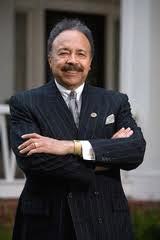In the weeks leading up to spring break at Hampton University, tensions on the Virginia coastal campus reached a boiling point and students took to the streets — and to the lawn of President William R. Harvey’s campus home — to air their grievances.
Within the last two weeks, hundreds of students have participated in a public campaign and used social media and news outlets to put forth their concerns.
During that time, Harvey and his administrative council have responded with a detailed plan of action to combat the problems and quell dissent on the 4,300-student campus that is often listed among the top historically Black institutions in the nation.
 Dr. William R. Harvey
Dr. William R. HarveyDiverse obtained recordings of a contentious Feb. 20 town hall meeting – a scheduled annual event – where students’ emotions ran high as they complained about issues ranging from the handling of sexual assault allegations to mold and other health-related problems in the dorms and cafeteria.
One of the major complaints, however, was the cancellation of some popular social functions on campus. It was this move that, according to some students, sparked the protests.
“People were doing things off this campus and on this campus that were illegal. We tried to work with you all for several years and you didn’t want to work with us,” Dr. Barbara Inman, vice president for administrative services, told the town hall audience.
The cancellation and suspension of the gatherings drew particular ire from the students, but despite their objections, Inman said the events would remain halted.
“Students could not control themselves, students were hit with canes,” she said. “So if we can’t conduct ourselves properly in our own home, then maybe we may need to step back and reevaluate why we are here.”
Inman said student government leaders met with administrators in an attempt to find a way to reinstate the events, but another disturbance took place, so the cancellation still stands.
One student was applauded when he asked, “Why does an entire school have to endure the consequences of not having [these] social events because of the actions of these individual students, being that these events enhance the social culture on campus and it drives new student enrollment?”
In response to other student complaints, the administration said it immediately responded to the students’ grievances and began posting a series of statements on its website addressing the problems.
But a week after the town hall meeting, the students staged a “silent protest,” walking across campus to the president’s lawn, where they again raised several complaints.
Since then, the university administration has posted and updated point-by-point responses.
On the issue of sexual assault complaints, the university says they “are handled by a network of professionals highly trained to deal with these matters.” According to the statement, members of the senior administration, along with representatives from the Title IX Office, have hosted a series of meetings with student leaders on campus during the last week.
“Informative sessions led by members of the network will be held in residence halls and with student organizations. We will continue to foster an environment where students feel comfortable reporting incidents and understand that when incidents are reported, the investigation will proceed.”
Regarding mold, which apparently was a long-standing issue in the buildings, the university statement reads: “Our beautiful campus is surrounded by water on three sides, and therefore is subjected to instances of mold more so than buildings located on drier land. Nevertheless, we have precautionary measures in place and are constantly on watch.”
The statement added that the university has contracted a Chesapeake, Va., company to inspect every residence hall for mildew and mold.
Regarding food services, the university said it is forming a Food Services Working Group and asked the SGA president to identify 10 students campus-wide “to join forces with the cafeteria staff and members of the administration” to address concerns.
In a statement to Diverse Wednesday, President Harvey commended the students. “Hampton University is proud of the way our students have respectfully addressed these matters of concern. The administration is actively resolving all of the issues, and in fact, most of the concerns were already being addressed under a three-year renovation plan.”
He noted a $20-million commitment to upgrade and enhance campus buildings and facilities. “The entire experience,” Harvey said, “has fostered a positive and meaningful dialogue between the students and the administration.”
Ya-Marie Sesay also contributed to this report.





















